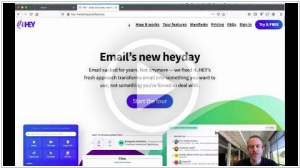Basecamp vs Confluence
August 10, 2023 | Author: Adam Levine
12
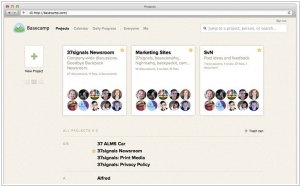
Basecamp tackles project management with a focus on communication and collaboration. Making to-do lists and adding to-do items literally just takes seconds. Basecamp is optimized to make the things you do most often really fast and really easy. Basecamp mobile is especially made for popular mobile devices like iPhone and Android.
29
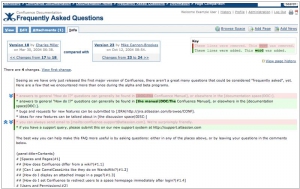
Confluence provides one place for technical teams to collaborate—create, share, and discuss your ideas, files, minutes, specs, mockups, diagrams, and projects. A rich editor, deep Office and JIRA integration, and powerful plugins help teams collaboratively develop technical docs, intranets, and knowledge bases.
Basecamp and Confluence are both widely used collaboration and project management tools, but they have distinct differences in their features and focus. Basecamp is known for its simplicity and user-friendly interface, offering features such as task management, document sharing, messaging, and scheduling. It emphasizes ease of use and provides a streamlined platform for teams to manage projects and collaborate effectively. On the other hand, Confluence, developed by Atlassian, is a robust team collaboration tool that focuses on creating, organizing, and sharing knowledge within teams and organizations. It offers features such as wiki pages, document collaboration, content creation templates, and integration with other Atlassian products. Confluence provides a centralized knowledge base for teams to capture and collaborate on information effectively.
See also: Top 10 Project Management software
See also: Top 10 Project Management software
Basecamp vs Confluence in our news:
2023. Atlassian brings an AI assistant to Jira and Confluence
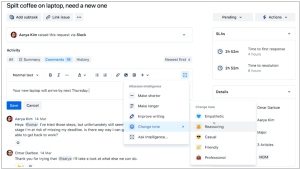
Atlassian has introduced Atlassian Intelligence, an AI-powered 'virtual teammate' that utilizes the company's proprietary models and OpenAI's large language models to create customized teamwork graphs. This technology enables various functionalities, such as AI-generated summaries in Confluence and test plans in Jira Software, as well as the rewriting of responses to customers in Jira Service Management. Atlassian Intelligence provides users with a chatbox similar to Chat-GPT, which is deeply integrated into different products and allows for the referencing of specific documents. For instance, to generate a summary of action items from a recent meeting, users can link the document with the transcript and request the summary inside Confluence. The tool then generates a list of decisions and action items from the meeting.
2021. Atlassian peps up Confluence with new graphical design features
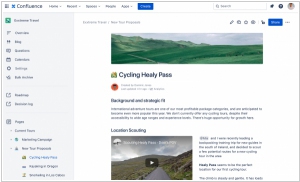
Confluence, the collaborative workspace developed by Atlassian, has been a staple knowledge-sharing tool for over 15 years, widely adopted by companies for its versatility. In its latest update, Confluence introduces several new features to enhance user experience. Users can now customize their spaces with cover images, title emojis, and personalized avatars that represent different sections of Confluence. The addition of smart links allows for seamless integration with platforms like YouTube and Trello, automatically recognizing and displaying links in their native formats. Furthermore, users can schedule the publication of new pages and convert pages into blog posts, reflecting the increasing popularity of corporate blogging within organizations, particularly for internal audiences during the pandemic.
2020. Basecamp launches Hey, a hosted email service for neat freaks
Project management software maker Basecamp has introduced an innovative hosted email service named Hey. With Hey, the company aims to tackle the chaos and clutter typically associated with traditional email inboxes. One of its notable features is a built-in screener that prompts users to confirm whether they wish to receive emails from new senders. Upon consent, inbound emails are sorted into different trays. The central "imbox" (short for important box) exclusively contains communications designated as important by the user. Newsletters are organized in a News Feed-style tray called The Feed, where they are conveniently displayed in a partially opened format for casual reading. Additionally, email receipts are neatly arranged in a dedicated inbox view called the Paper Trail, serving as a reference for users.
2020. Atlassian’s Confluence gets a new template gallery
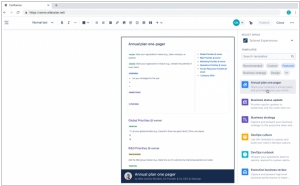
Confluence, the content-centric collaboration tool by Atlassian, is simplifying the onboarding process for new users through the introduction of an enhanced template gallery, featuring 75 additional templates. This update signifies the evolution of Confluence from a specialized wiki primarily used by technical documentation teams to a widely adopted tool utilized across various organizations. The revamped template gallery offers improved search tools, filters, and previews conveniently located in the right-hand panel of your Confluence site. These enhancements facilitate the seamless discovery of templates that are most relevant to your business needs.
2018. Basecamp adds recurring events and image galleries
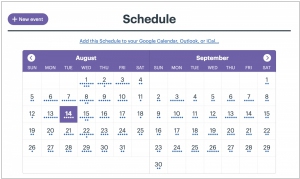
Project management service Basecamp has introduced several exciting new features. The first addition is Recurring events, allowing users to schedule daily, weekly, monthly, and yearly repeating events within Basecamp 3. Users can choose to set the recurrence until a specific date or continue indefinitely. The second feature is Image galleries, which enables users to showcase their work or share photos in visually appealing side-by-side or three-in-a-row layouts. This enhancement makes it easier than ever to present visual content. Lastly, Basecamp introduces Automatic Check-ins, a simple and informal tool extensively utilized for team communication. The entire company can engage in queries such as sharing weekend activities and work updates, while smaller teams like Support can address specific questions related to common issues encountered during the week. These new features enrich the Basecamp experience, enhancing collaboration and streamlining communication within teams.
2018. Basecamp improves client collaboration
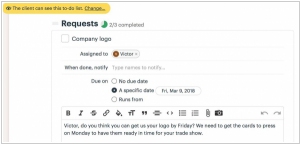
Collaborating with clients in Basecamp has been significantly enhanced, offering an improved experience. The latest updates enable you to effortlessly assign to-dos to clients, share files and folders, schedule events and meetings, engage in Campfire chats, and even automatically ask clients check-in questions. Within a project, all items are now clearly labeled as either "private to our team" or "visible to the client." To avoid any unexpected sharing mishaps and minimize concerns, every item within a project begins as private, accessible only to your team. When you post something new, you have the flexibility to specify whether it should be visible to the client or remain private within your team. These enhancements ensure smoother collaboration and allow for precise control over shared information in Basecamp.
2014. Basecamp app is available for iPad
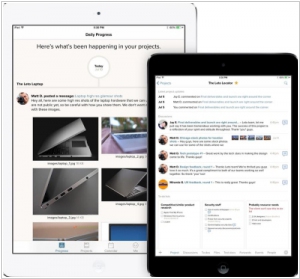
The official app for iPad has been launched by the popular project management service Basecamp, expanding beyond its previous availability only on iPhone and the web for iPad users. This app enables users to conveniently access their projects from anywhere, providing updates on each project's latest news, facilitating participation in discussions and sharing thoughts, and allowing the viewing of team members' progress as they complete tasks and upload files. With all project-related information accessible, users can easily reference documents and make decisions regardless of their location. The app boasts a swift and responsive performance, featuring a clean and well-organized interface.
2014. Atlassian launches JIRA and Confluence for large companies
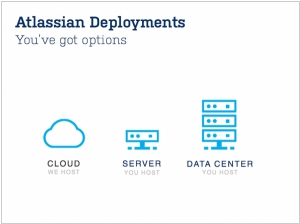
Atlassian has unveiled two new products designed specifically for large enterprises. In the upcoming week, Atlassian will release JIRA Data Center, a version of its project management software that supports running the service on multiple nodes. Additionally, later this summer, it will introduce Confluence Data Center, a collaboration service centered around wikis. With the Data Center versions, larger companies will enjoy improved support for scaling the services across multiple nodes, resulting in enhanced performance and scalability. Administrators will have the ability to route specific applications, teams, or geographies to designated nodes within a cluster, while additional nodes can be added in real time. The clustering technology and shared file systems are seamlessly integrated with industry-standard technologies, ensuring smooth operations.
2014. 37Signals renames to Basecamp, discontinues development of other products

37Signals emerged as one of the pioneers in the SaaS market. In 2004, they introduced Basecamp, a project management service that remains highly popular to this day. It boasts a user base of 15 million individuals and is often regarded as a trailblazer in web-app design. Notably, 37Signals CEO, Jason Fried, is widely recognized, and he has authored books such as Getting Real and ReWork. Jason's profound admiration for small businesses and the startup ethos is evident. Despite Basecamp's remarkable success, he has successfully maintained the startup mentality within the company, employing only 43 individuals. Jason even experimented with scaling back the customer base to control growth. Presently, he has conceived a new idea: to pause the development of other products (including the CRM system Highrise, group chat Campfire, task-manager Ta-Da List, wiki Writeboard, and organizer Backpack) and concentrate all efforts on Basecamp. Moreover, he has decided to rename the company from 37Signals to Basecamp, a concise and elegant title. If you are a user of 37Signals products affected by this decision, there is no need to panic. The products will continue to function and receive support in the future, albeit without further feature updates.
2013. Basecamp launches mobile app for iOS
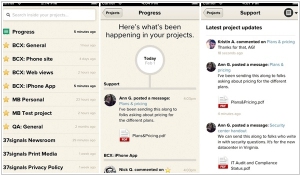
HTML5 has taken a backseat to mobile applications, at least for the time being. Jason Fried, the CEO of the highly popular project management service Basecamp, has always prioritized the effectiveness of his product over following trends or engaging in mere PR stunts. He previously held the belief that focusing on the web interface was the best approach rather than chasing the multitude of mobile platforms. As a result, Basecamp was only available as a web app for mobile devices. However, Jason has recently concluded that a native client would offer greater convenience. As a result, Basecamp is now accessible as a native app for iPhone and iPad. The app is free and showcases the new, visually appealing style of the web version.

